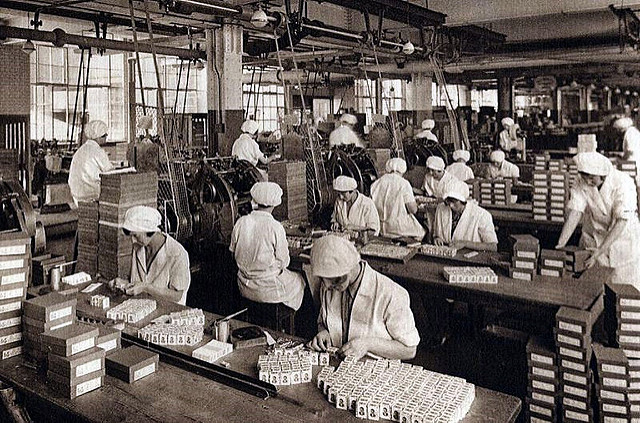Unlock the Magic in Your Story Now
Get the Free 20 questions to Ask Before Launching Your Idea workbook when you sign up for occasional updates.
Get the Free 20 questions to Ask Before Launching Your Idea workbook when you sign up for occasional updates.
Articles filed in: Success
Profit And…
 My mother started working over sixty years ago. As the tenth child of a widow, with nothing more than a basic education she had very few choices. She could be a seamstress or a replaceable cog on the assembly line at one of any number of factories. Sadly the factory jobs won because those jobs were easier to get and didn’t involve apprenticing at a reduced wage. At the age of fourteen, she spent eight hours a day dipping toffees into icing at a sweet factory. She later graduated to standing guard over huge fryers of potato crisps. She and her friends lived for Friday’s brown paper envelope—the contents of which bought a little joy at the weekend.
My mother started working over sixty years ago. As the tenth child of a widow, with nothing more than a basic education she had very few choices. She could be a seamstress or a replaceable cog on the assembly line at one of any number of factories. Sadly the factory jobs won because those jobs were easier to get and didn’t involve apprenticing at a reduced wage. At the age of fourteen, she spent eight hours a day dipping toffees into icing at a sweet factory. She later graduated to standing guard over huge fryers of potato crisps. She and her friends lived for Friday’s brown paper envelope—the contents of which bought a little joy at the weekend.
A career needs to sustain us, and a business needs to make a profit to be sustainable. It could be argued that in recent times we’ve built our economies on the premise that profiting is the only function of business. But the businesses that are thriving have found a way to be about more than just a means to that end. Companies like Airbnb, Patagonia or Small Giants that put contribution and community at the centre of their business model and philosophy. Yes, your business needs to turn a profit, but that doesn’t have to be the only thing your company is committed to making.
My mother didn’t have a choice about how she could contribute. She didn’t have the privilege of thinking beyond earnings. We do. We have never had more power to take ownership of the present or to shape the future than we do today. We can start by figuring out what we intend to make besides money.
Image by Paul Townsend
How Are You Measuring Your Lead?
 As a society, we have become obsessed with getting and staying ahead. We have become addicted to winning, and thus to comparing ourselves to others—not just in business, but in life too.
As a society, we have become obsessed with getting and staying ahead. We have become addicted to winning, and thus to comparing ourselves to others—not just in business, but in life too.
But being ahead, either materially or psychologically is a slippery slope to a mindset of never enough. A culture designed to separate us into winners and losers inevitably becomes one where we’re not winning unless someone else is losing. This limited worldview is a limiting foundation for our societies and our economies, our communities and our businesses. It’s also a poor measure of humanity and the change we are capable of creating.
Perhaps the bigger question to consider then is not how we measure our lead, but why we feel the need to compete and compare in the first place. It turns out that when we can set our own meaningful standard of success, we’ve already won by every measure.
Image by Kreg Steppe
The Difference Between Good And Great
 The tiny Italian restaurant in Carlton is in full swing. It’s 6 pm, and a couple of experienced chefs are cranking out meals. The kitchen is a well-oiled machine, the oven is at capacity, as diners and Uber Eats drivers converge at once. The food is good. It’s just not great—unlike the food served at the Italian place we recently discovered in Auckland.
The tiny Italian restaurant in Carlton is in full swing. It’s 6 pm, and a couple of experienced chefs are cranking out meals. The kitchen is a well-oiled machine, the oven is at capacity, as diners and Uber Eats drivers converge at once. The food is good. It’s just not great—unlike the food served at the Italian place we recently discovered in Auckland.
On the face of it, there’s little to differentiate the chefs in the two restaurants. Both teams work mostly silently and efficiently. They are well prepared, and everyone understands the role they play in making sure diners leave sated and satisfied. But there’s one thing the chefs in Auckland do that makes all the difference. In Carlton, nothing is tasted before it’s plated. In Auckland, the chefs taste everything without exception before they plate it. They are making a hundred micro-decisions about how to delight their customers every few minutes and adjusting as they go. That single act means they have to put themselves in the diner’s seat for a second. They have to imagine what it will feel like to experience their product. And that makes all the difference.
Good becomes great when we put the customer at the centre of everything we do.
Image by visitflanders
Victims Of Success
 We’ve all been let down by a business we were loyal to or disappointed by a product we once loved. When we dissect what happened, it’s often possible to trace the missteps to a single source. Thriving businesses become victims of their success, and great products become mediocre when the people who built them forget how they got from there to here.
We’ve all been let down by a business we were loyal to or disappointed by a product we once loved. When we dissect what happened, it’s often possible to trace the missteps to a single source. Thriving businesses become victims of their success, and great products become mediocre when the people who built them forget how they got from there to here.
No matter how successful you become, the often intangible qualities that differentiated you in the beginning, will continue to be what keeps customers coming back.
Image by pkhamre
The Forgotten Power Of The Single Interaction
 On a recent trip to Waiheke Island with my husband, we stopped a bus that wasn’t going our way. The driver told us to hop on anyway, and he’d take us to where we could catch a bus that would get us to where we wanted to go. Then, wait for it—he radioed ahead to the driver of that bus to let her know he had a couple of passengers on board who needed to catch her bus. She was waiting for us at the depot when we got there.
On a recent trip to Waiheke Island with my husband, we stopped a bus that wasn’t going our way. The driver told us to hop on anyway, and he’d take us to where we could catch a bus that would get us to where we wanted to go. Then, wait for it—he radioed ahead to the driver of that bus to let her know he had a couple of passengers on board who needed to catch her bus. She was waiting for us at the depot when we got there.
The driver of the wrong bus could simply have done his job. He could have told us to wait for the next bus that was due in twenty minutes. He could have decided that in the scheme of things this one interaction was insignificant. He chose to think otherwise.
In our globalised, digital world, as we try to hustle our way to making a bigger impact, it’s easy to forget that change doesn’t have to happen at scale. Just as a single well-placed domino in a domino run can knock all the dominos down one-by-one, we each have the power to change a day or a life in a single interaction. We don’t have to reach everyone all at once.
Image by Nina
Everything Starts With Something
 When we’re starting a project or working towards a business development goal we typically have a laundry list of everything we want to do. From developing a new product to filing our tax returns, it’s in our nature to want to make immediate and visible progress all at once. That desire to do everything often results in paralysis. Everything seems overwhelming. Everything is daunting. Everything is impossible. So we end up doing nothing.
When we’re starting a project or working towards a business development goal we typically have a laundry list of everything we want to do. From developing a new product to filing our tax returns, it’s in our nature to want to make immediate and visible progress all at once. That desire to do everything often results in paralysis. Everything seems overwhelming. Everything is daunting. Everything is impossible. So we end up doing nothing.
When we’re in a state of indecision or overwhelm about the next step to take there’s a magic question we can ask ourselves to clarify our options and create momentum.
‘If you could do anything, what would that be?’
The simplicity of some of the things on your ‘anything’ list will surprise you. Suddenly everything you could do becomes the things you should do. From there the trick is to pick one thing you will do. Everything starts with something. But only if you begin.
Image by Simon Q
A World Built On Promises
 Scott and Joanna are planning to open a two-hundred-seater restaurant along a small shopping strip that backs onto a residential area in their local suburb. They know the neighbours will be concerned about the prospect of increased traffic and noise from the venue, especially at the weekend when they open until 1 am. So they draw up a plan to mitigate the negative impact their business might have on the people who live in the area. They commit on paper to limiting the number of patrons allowed in the rooftop bar and to monitoring late-night noise levels. The trouble with the plan is that the restauranteurs’ intentions are at odds with the commercial reality of running a viable business. Their success depends on having a restaurant and bar full of happy customers spending money late into the evening. They will find it almost impossible to make the business profitable while simultaneously keeping the neighbours happy. Their goals are at odds with each other.
Scott and Joanna are planning to open a two-hundred-seater restaurant along a small shopping strip that backs onto a residential area in their local suburb. They know the neighbours will be concerned about the prospect of increased traffic and noise from the venue, especially at the weekend when they open until 1 am. So they draw up a plan to mitigate the negative impact their business might have on the people who live in the area. They commit on paper to limiting the number of patrons allowed in the rooftop bar and to monitoring late-night noise levels. The trouble with the plan is that the restauranteurs’ intentions are at odds with the commercial reality of running a viable business. Their success depends on having a restaurant and bar full of happy customers spending money late into the evening. They will find it almost impossible to make the business profitable while simultaneously keeping the neighbours happy. Their goals are at odds with each other.
We sometimes make promises we know in our hearts won’t be easy to keep. There will inevitably be times when we must balance good intentions with commercial imperatives. But saying one thing then doing another is the surest way to erode, not only the trust of others but our sense of integrity. The alternative is to make more honest promises, to focus on why we’re committed to keeping that promise and how exactly we’re going to do it, rather than just simply on what’s being promised.
We live in a world built on promises.
The people who keep them are the ones who win in every sense of the word.
Image by Elisa Dudnikova
Who Trusts You?
 We spend a lot of time wondering who we can trust. We are careful to work out who is worthy of our friendship, business or time. And yet, we often fail to make the connection between trust and success when it comes to ourselves.
We spend a lot of time wondering who we can trust. We are careful to work out who is worthy of our friendship, business or time. And yet, we often fail to make the connection between trust and success when it comes to ourselves.
You don’t become trusted by being more successful.
You become successful by being more trusted.
Start there.
Image by Zi Krostag
In Praise Of Intangibles
 Think about all the things you didn’t charge your customers for today, those things that don’t appear as line items in your budget. The care with which you choose ingredients. The way you treat your employees. The time you spend listening to a prospective customer’s problems, so you can excel at anticipating your future customer’s needs.
Think about all the things you didn’t charge your customers for today, those things that don’t appear as line items in your budget. The care with which you choose ingredients. The way you treat your employees. The time you spend listening to a prospective customer’s problems, so you can excel at anticipating your future customer’s needs.
The intangibles that differentiate your business may not be visible on the balance sheet today, but they might just be the reason it endures.
Image by Creative Industries
A Measure Of Progress
 In the animal kingdom ‘more’ is often the best measure of success. Herds and hoarders have a better chance of survival. But ‘more’ isn’t always the best measure of human progress.
In the animal kingdom ‘more’ is often the best measure of success. Herds and hoarders have a better chance of survival. But ‘more’ isn’t always the best measure of human progress.
The longest queue isn’t always a sign of better quality.
The most sales don’t always lead to a more sustainable business.
The greatest number of Facebook likes isn’t always an indication of the deepest impact.
The biggest accolade doesn’t always lead to the greatest fulfilment.
A lot of what we do every day is done in the blind pursuit of attaining more without making a direct connection to the benefit we hope to reap. But the largest number isn’t always a measure of progress. Is accumulating more followers on social media the best way to grow your business? Can you continue to produce more products with the same sense of integrity? Will you be able to give the additional customers the experience they deserve? Why is this growth strategy right for you?
It’s just as important to be intentional about the reasons we desire growth as it is to grow.
Grow because you must, not because you think you should.
Image by Jamie McCaffrey